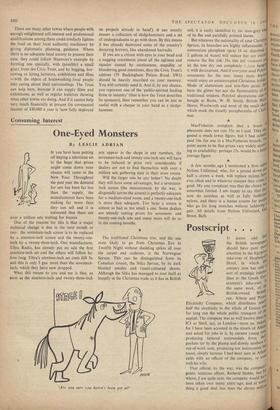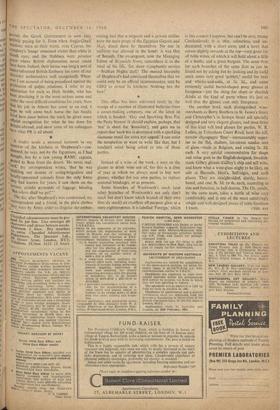Postscript . .
the British newspaPer5 should have paid In°re attention to the EgYPtio° take-over of Shephcard5 this Hotel, in which country now has oillY sort of nostalgic interest' than to the Greek Gov. ernment's take-ovel the same week, of the British-owned. Britisil. run, Athens and PI015 carlY Electricity Company, which distributes n A half the electricity in the whole of Greece arw for long ran the whole public transport of tilt capital. The company was as well known there° de4 ICI or Shell, say, in London—more so, in for I have been accosted in the streets of Al 11°15 and asked for jobs in it, by earnest young Mew, producing tattered testimonials from thel; pockets (or by the plump and dowdy mothers out-of-work sons, producing not testimonials Is but tears), simply because I had been seen in Al hen: cafes with an official of the company, or eve'.
with his wife. anY'S- That official, by the way, was the comP t Pt ' 2. public relations officer, Richard Stubbs, bu have whom, I am quite sure, the company would oirir been taken over many years ago, and at s 00 0 thing a good deal less than the eleven m Pounds the Greek Government is now very Politely pay ing for it. Even when Anglo-Greek relations were at their worst, over Cyprus, the company's 'image' remained whiter than white in Creek eyes, and the Stubbses were polo= !Mk' where British diplomatists never could have been. Indeed, their house was long a sort of better-informed British Embassy (as some of our Shrewder ambassadors \veil recognised). When- ever I am accused of being prejudiced against the Profession of public relations, I refer to my admiration for such as Dick Stubbs, who has been practising it in the most serious sense and Under the most difficult conditions for years. Now that his job in Athens has come to an end, I h°Pe he will come back home (he has hardly lived here since before the war); be given some recognition for what he has done for Britain abroad; and show some of his colleagues here what PR is all about.
A reader sends a personal footnote to my rnention of the kitchens at Shepheard's—con- clemned, he says, not by the Egyptians, as I had thought, but by a raw young RAMC captain, Posted to Base from the desert. 'He never real- ised,' my correspondent writes, 'that he was .1‘vinkling out dozens of acting-brigadiers and `IcallY-appointed colonels from the only home theY had known for years. I saw them on the terrace, amidst pyramids of luggage, bleating "But where shall we go?"' The day after Shepheard's was condemned. my correspondent and a friend, in the plain clothes 11.14 wore by Army order to disguise the embar- rassing fact that a sergeant and a private soldier were the main props of the Egyptian Gazette and Mail, dined there by themselves. No one in uniform was allowed in the hotel: it was Out of Bounds. The ex-sergeant, now the Managing Editor of Reynolds News, remembers it as the meal of his life, 'for sheer sycophantic service —Arabian Nights stuff! The massed hierarchy of Shepheard's had convinced themselves that we could only be an official reconnaissance, sent by GHQ to re-test its kitchens. Nothing but the best!'
This office has been enlivened lately by the receipt of a number of illustrated bulletins from a corset-making company, one of the latest of which is headed : 'Gay and Sparkling Bras For the Party Season' (1 should explain, perhaps, that 'bra' is short for 'brassiere'), and goes on to report that 'each bra is decorated with a sparkling diamante motif for extra eye appeal.' 1- can resist the temptation to want to write like that, but I wouldn't mind being asked to one of those parties.
Instead of a wine of the week, a note on the glasses to drink wine out of, for this is a time of year at which we always need to buy new glasses, whether for our own parties, to replace seasonal breakages, or as presents.
Some branches of Woolworth's stock (and other branches of Woolworth's not only don't stock but don't know which branch of their own firm do stock) an excellent all-purpose glass at a mere eighteenpence. It is labelled 'Foreign,' which in this context I suppose, but can't be sure, means Czechoslovak; it is thin, colourless, and un- decorated, with a short stem, and a bowl that curves slightly inwards at the top—very good for all table wines, of which it will bold about a fifth of a bottle, and a great bargain. The same firm (or such branches of the same firm as can be found not by asking but by looking and by luck) stock sonic very good 'goblets,' useful for beer and whisky-and-soda, at Is. 3d., and some extremely useful barrel-shaped pony glasses at fourpence—just the thing for short or shortish drinks at the kind of party where it's just as well that the glasses cost only fourpence.
On another level, such distinguished %% me- merchants as Berry Brothers in St. James's Street and Christopher's in Jermyn Street sell specially designed and very elegant glasses, and most firms of this kind will lend glasses for parties. W. R. Loftus, in Tottenham Court Road, have the tail, narrow champagne 'flute'—immeasurably super- ior to the flat, shallow, ice-cream sundae sort of glass—made in Belgium, and costing 3s. 5d. each. A very special commendation for shape and value goes to the English-designed, Swedish- made Gilbey glasses (Gilbey's ship and sell wine, and know what a wine-glass ought to be like), on sale at Harrods, Heal's, Selfridges, and such places. They arc straight-sided, sturdy, heavy- based, and cost 3s. 3d. to 4s. each, according to size and function, in half-dozens. The 15s. carafe, by the same team, takes a bottle of wine very comfortably and is one of the most satisfyingly simple and ■\ ell-designed pieces of table furniture



































 Previous page
Previous page